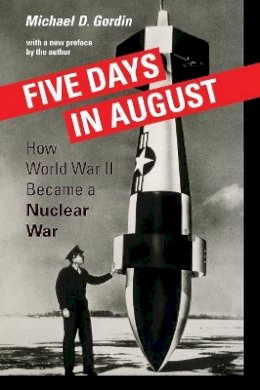24%OFF

Stock image for illustration purposes only - book cover, edition or condition may vary.
Five Days in August: How World War II Became a Nuclear War
Michael D. Gordin
€ 26.99
€ 20.60
FREE Delivery in Ireland
Description for Five Days in August: How World War II Became a Nuclear War
Paperback. Num Pages: 232 pages, 2 halftones. 5 maps. BIC Classification: 1D; 3JJH; HBJD; HBLW; HBWQ; JWMN. Category: (P) Professional & Vocational; (U) Tertiary Education (US: College). Dimension: 157 x 234 x 19. Weight in Grams: 338.
Most Americans believe that the Second World War ended because the two atomic bombs dropped on Japan forced it to surrender. Five Days in August boldly presents a different interpretation: that the military did not clearly understand the atomic bomb's revolutionary strategic potential, that the Allies were almost as stunned by the surrender as the Japanese were by the attack, and that not only had experts planned and fully anticipated the need for a third bomb, they were skeptical about whether the atomic bomb would work at all. With these ideas, Michael Gordin reorients the historical and contemporary conversation about ... Read more
Most Americans believe that the Second World War ended because the two atomic bombs dropped on Japan forced it to surrender. Five Days in August boldly presents a different interpretation: that the military did not clearly understand the atomic bomb's revolutionary strategic potential, that the Allies were almost as stunned by the surrender as the Japanese were by the attack, and that not only had experts planned and fully anticipated the need for a third bomb, they were skeptical about whether the atomic bomb would work at all. With these ideas, Michael Gordin reorients the historical and contemporary conversation about ... Read more
Product Details
Format
Paperback
Publication date
2015
Publisher
Princeton University Press
Condition
New
Number of Pages
232
Place of Publication
New Jersey, United States
ISBN
9780691168432
SKU
V9780691168432
Shipping Time
Usually ships in 7 to 11 working days
Ref
99-1
About Michael D. Gordin
Michael D. Gordin is professor of the history of science at Princeton University. He is the author or editor of several books, including Red Cloud at Dawn: Truman, Stalin, and the End of the Atomic Monopoly.
Reviews for Five Days in August: How World War II Became a Nuclear War
"Michael D. Gordin's worthy study concludes that the bomb's uniqueness has inappropriately encouraged Japan's reluctance to recognize and evaluate its war responsibility, and points toward the importance of examining nuclear weapons outside the familiar context of a nuclear standoff."
Publishers Weekly "Gordin has done an excellent job in surveying the diverse views on what happened during those momentous five days in ... Read more
Publishers Weekly "Gordin has done an excellent job in surveying the diverse views on what happened during those momentous five days in ... Read more
.png)